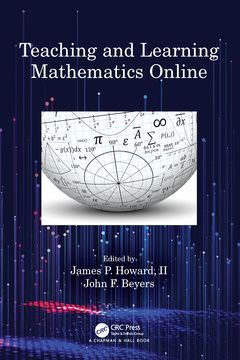Teaching and Learning Mathematics Online
Coordonnateurs : Howard, II James P., Beyers John F.

Online education has become a major component of higher education worldwide. In mathematics and statistics courses, there exists a number of challenges that are unique to the teaching and learning of mathematics and statistics in an online environment. These challenges are deeply connected to already existing difficulties related to math anxiety, conceptual understanding of mathematical ideas, communicating mathematically, and the appropriate use of technology.
Teaching and Learning Mathematics Online bridges these issues by presenting meaningful and practical solutions for teaching mathematics and statistics online. It focuses on the problems observed by mathematics instructors currently working in the field who strive to hone their craft and share best practices with our professional community. The book provides a set of standard practices, improving the quality of online teaching and the learning of mathematics. Instructors will benefit from learning new techniques and approaches to delivering content.
Features
- Based on the experiences of working educators in the field
- Assimilates the latest technology developments for interactive distance education
- Focuses on mathematical education for developing early mathematics courses
Part I. Course Design. 1. Teaching Cross-Listed Mathematics Courses Online. 2. What Do We Know about Student Learning from Online Mathematics Homework? 3. Designing mathematics hybrid classrooms in high school: the case of Valeria. 4. Designing mathematics hybrid classrooms in high school: the cases of Nicoletta and Lorenza. 5. Upper Level Mathematics and Statistics Courses Shared Across Campuses. 6. Online Statistics Teaching and Learning. 7. Statistics for Engineers. Part II. Student Interaction. 8. Encouraging higher-order thinking in online and hybrid mathematics and statistics courses. 9. Tools for communication and interaction in online mathematics teaching and learning. 10. Managing Students’ Mathematics Anxiety in the Context of Online Learning Environments. 11. A Face-to-Face Program of Support for Students in a Hybrid Online Developmental Mathematics Course. 12. A Practical Guide to Discussions in Online Mathematics Courses. Part III. Using Technology. 13. Cognitive Load Theory and Mathematics Instruction through MOOCs. 14. Technological Pedagogical Content Knowledge for Meaningful Learning and Instrumental Orchestrations: A Case Study of a Cross Product Exploration using CalcPlot3D. 15. Enhancement of Mathematics Learning through Novel Online Tools. 16. Making Online Mathematics Method Courses Interactive and Effective with OER. 17. Developing Interactive Demonstrations for the Online Mathematics Classroom: Interactive Diagrams. Part IV. Teacher Education. 18. MOOCs for mathematics teacher education: new environments for professional development. 19. Online Mathematics "Self-Help Kiosks" to Support Pre-Service Teachers. Part V. Commentary. 20. Online mathematics education, the good, the bad, and the general overview
James P. Howard, II is a scientist at the Johns Hopkins Applied Physics Laboratory. Previously, he worked for the Board of Governors of the Federal Reserve System as an internal consultant on statistical computing. He has also been a consultant to numerous government agencies. Additionally, he has taught mathematics, statistics, and public affairs since 2010. He has a Ph.D. in public policy from the University of Maryland Baltimore County.
John F. Beyers, PhD, is Program Chair and Professor of Mathematics and Statistics at the University of Maryland Global Campus (formerly UMUC). Dr Beyers leads a global department of 200+ faculty to serve the educational needs of over 20,000 non-traditional, underrepresented undergraduate students globally. He is responsible for new program development, curriculum planning, teaching effectiveness and Learning Outcomes Assessment. Prior to his current position, Dr Beyers was the Associate Director for the Center of Distance Education at Johns Hopkins University.
Dr Beyers has an extensive academic background as a faculty member and leader of one of the largest online mathematics and statistics departments in the country. While earning a PhD in mathematics education from American University (his dissertation was the first to earn "pass with distinction" in over two decades), Dr Beyers began his career in innovative education as Research Coordinator on the NCTM Standards 2000Project, which resulted in the national standards document Principles and Standards for School Mathematics (NCTM, 2000). He later worked with post-secondary students and faculty at Johns Hopkins University’s Center for Distance Education on innovative distance education models to determine how difficult/easy is it for faculty to embed or integrate technologies into a course and in harmony with their pedagogic model.
Dr Beyers has been recognized for his efforts as an innovative academic leader in higher education. In 2012, h
Date de parution : 11-2021
17.8x25.4 cm
Date de parution : 06-2020
17.8x25.4 cm
Thèmes de Teaching and Learning Mathematics Online :
Mots-clés :
MOOC Video; Online Homework System; Interactive demonstrations; College Algebra Students; Online classrooms; Online Mathematics Courses; Synchronous instruction; Open Educational Resources; Asynchronous instruction; Online Teaching Formats; MOOC's; Developmental Mathematics; mathematical education; MOOC; online teaching and learning; Student Engagement; teaching mathematics; Stem Major; interactive distance education; Lesson Image; Virtual Manipulatives; Mathematics Anxiety; Remote Students; Gibbs Sampler; Online Homework; Hybrid Learning Environment; Mathematics Courses; Mathematics Method Courses; Peer Mentoring Program; Algebra Tiles; Developmental Mathematics Students; Teacher Candidates; TPACK; Moodle Site; best practices; conceptual understanding; online education; practical solutions; techniques; technology


